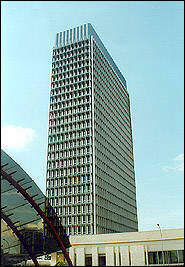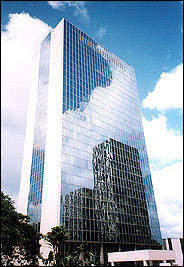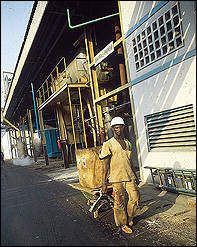 Politics, economics and legal system Politics, economics and legal system |
Côte d'Ivoire has a presidential regime. The Head of State, President of the Republic, is elected by direct universal suffrage for five years renewable.
The executive power is held by the President of the Republic. He is assisted by a Government headed by a Prime Minister.
The legislative power is assumed by a Parliament whose 175 members are elected for a period of five years by universal suffrage.
At the administrative level, the country is divided into 16 regions administered by local prefects.
Côte d'Ivoire is member of several intergovernmental and international organisations, of which: the United Nations, UNDP, OAU, l'OAPI, l'UEMOA, ECOWAS, the " Conseil de l'Entente ", WTO. It is also member of the European Union / ACP Convention or Lomé Convention.
Côte d'Ivoire is signatory to several international conventions the purpose of which is to cancel double taxation in the area of corporate tax and sometimes where taxation is considered in the area of inheritance:
- the "Convention de l'Organisation Commune Africaine et Mauritienne'' (OCAM), which is still in force for the countries which were members,
- UEMOA,
- and the following European countries: France, Germany, Belgium, Norway, Canada, Great Britain, Italy, Switzerland.
Many regional or international institutions have chosen Côte d'Ivoire as their Headquarters or their regional representations for example: ADB, IFC, UNDP, UNIDO, Fonds de Garantie du Conseil de l'Entente, UEMOA banking commission, the Regional STOCK Exchange, Air Afrique, etc.
 Economy Economy |

The Ivorian economy is a free-market economy open on the outside world both for trade and investments. Hence, investments, domestic and foreign, trade, prices and employment are liberalised.
To face a continuing crisis which strongly hampered its economic and social development as from the early 80's, the Government took a set of adjustment, stabilisation and then economic recovery measures in 1989. These measures have allowed to cancel the disturbances and inflexibilities to which the State was faced in the sectors of agriculture, energy and water. They have also enabled to reorganise the financial sector and restore the overall competitiveness of the economy and improve health and education services.
As from the month that followed, or January 1994, a change in the parity of the CFA franc took place and the Government adopted measures at the tax, administrative, budgetary and monetary levels, thus enabling the country to rapidly restore growth, (-1% in 1987, 2.0% in 1994 and 7% in 1995 and 1996). GDP recorded an amount of 5 467 billion CFA F in 1996.
The sectorial breakdown of the GDP is as follows:
- Primary sector 34%
- Secondary sector 20%
- Tertiary sector 46%
The growth of the Ivorian economy should intensify in the coming years, thanks, among others, to the active investment promotion policy initiated by the Government, aiming at developing:
- a mechanised intensive and largely deversified agriculture ;
- mining, energy and industrial exploitation ;
- services, including tourism, financial and banking services ;
- exports.
Côte d'Ivoire is an open country. It has trade relations with almost all the countries. Ivorian exports are high with 2,228.2 billion CFA F. The main exports products: coffee, cocoa, timber, palm oil, oil products, rubber, cotton. The main clients of Côte d'Ivoire are: France, Nigeria, Germany, the Nertherlands, United States of America, etc. The Ivorian imports are high with 1,438.7 billion in 1996. The main suppliers to Côte d'Ivoire, are, in order: France, Nigeria, United States of America, Germany and Japan.
 Monetary policy Monetary policy |
Côte d'Ivoire belongs to the franc zone. The Issuing bank is the " Banque Centrale des Etats de l'Afrique de l'Ouest (BCEAO) ". The Ivorian policy in this field is characterised by a very liberal regulation and free transfer of profits and dividends as well as proceeds of liquidation.
 Establishment of Companies Establishment of Companies |
The formalities for incorporating companies are really facilitated since the establishment of CEPICI and its One-Stop-Shop to free the investor from cumbersome and repetitive formalities:

The formalities for incorporating companies are summarised as follows:
- the registration of the Articles of Association
- the submission of the Articles of Association to the Registrar of the Court
- the publication of the establishment notice
- the registration on the trade registry
- the declaration of tax existence | - the registration on the foreign trade registry
- registration with the national social security fund.
The minimum capital required for a limited public company and a public company is 1,000,000 CFA F.
A 100% foreign capital compagny may be freely established under the same conditions and formalities as for the nationals.
 Manpower Manpower |

Companies are free to recruit and lay off.
There is no specific restriction for employing foreign labour in Côte d'Ivoire. However, the use of foreign labour is submitted to prior autorisation of the "Agence d'Etudes et de Promotion de l'Emploi (AGEPE)'', an agency in charge of employment research and promotion and to the labour inspection.
The training structures established in Côte d'Ivoire contribute to the training of qualified and abundant human capital, and this, of course curbs the use of foreign workers.
Salary structure is as follows:
Guaranteed minimum wage (Manufacture): 211 F CFA/hour or 36,607 CFA F / month
Agricultural Sector (Guaranteed minimum wage): 333 F / day
Forest sector (Guaranteed minimum wage) 581 F / day
Concerning the managerial staff, their salaries are fixed after negotiation.
Number of public holidays: 14 days
Working time:
- 40 hours, a week for non agricultural companie
- 48 hours for agricultural farming units and equivalent
Social insurance contributions
- Family fringe benefits: 5.5% of the salary with a ceiling level of 70,000 CFA F/month, to be fully bome by the employee.
- Industrial injuries and diseases:
2 to 5% 1 of the salary with a ceiling level of 70,000 CFA/month to be fully bome by the employee.
- Pension rate = 4% out of which
+ 2.4% to be fully bome by the employee. (ceiling at 45 times the guaranteed minimum wage)
+ 1.6% to be fully bome by the employee (ceiling at 45 times the guaranted minimum wage)
 Taxation Taxation |
 Tax system Tax system |
Tax on trade and industrial benefits and on agricultural benefits
Incorporated companies 35%
Individual companies 25%
Non trade benefits 25%
 Tax on income from stock Tax on income from stock |
Dividends 10%
Income 6 to 15%
The income obtained by people established in a UEMOA countries are fax free.
Tax on income from loans: 9 to 18%
 VAT VAT |
reduced rate 10% all taxes inclusive ; 11.11% Free of tax,
Customs duties 11%
Standard rate 16.67 all taxes inclusive 20% free of tax.
Customs duties 20%
Tax on salaries:
Local staff Expatriates
Contribution of employee No 9.2%
National Contribution 1.2% 1.2%
Training tax 0.4% 0.4%
Vocational training 1.2% 1.2%
1 The rate varies according to the activity of the company
Real estate tax:
 Taxes on developed real estates Taxes on developed real estates |
(base: rental value as of 1st January of each taxation year):
Taxable developed real estate 15%
House inhabited by the awner 4%
House owned by charitable associations 4%
Vacant block of flats 4%
Non developed lands:
4% during the first two years of taxation
5% during the third year
6% as from the fourth year.
 Incentives in the manufacturing sector Incentives in the manufacturing sector |
Local and foreign investors benefit from the same incentives.
The Investment Code has instaured two separate incentive regimes and two geographical zones allowing benefits on a longer periode in the interior:
 Measures applicable to all investments associated with the establishment of a project Measures applicable to all investments associated with the establishment of a project |
exemption on tax on industrial and trade benefits or on trade benefits during a period of 5 to 8 years ;
exemption on licence during the same period.
Measures applicable to investments above 500 million CFA F:
+ tax holidays for VAT on import equipment, land, materials and on the firts shipment of spare parts, for investments above 500 million ;
+ levy of a unique and preferential tax on equipments, materials and spare parts for investments between 500 million and 2 billion CFA F ;
+ tax holidays for duties and taxes on equipments, materials and on the first shipment for investments over 2 billion CFA F ;
+ tax holidays for land tax on developed lands for investments above 2 billion CFA F.
This set of measures does not oppose the application of specific measures provides for by the " Code Général des Impôts, the Code Général des Douanes " and, if necessary, by the Mining Code. |

